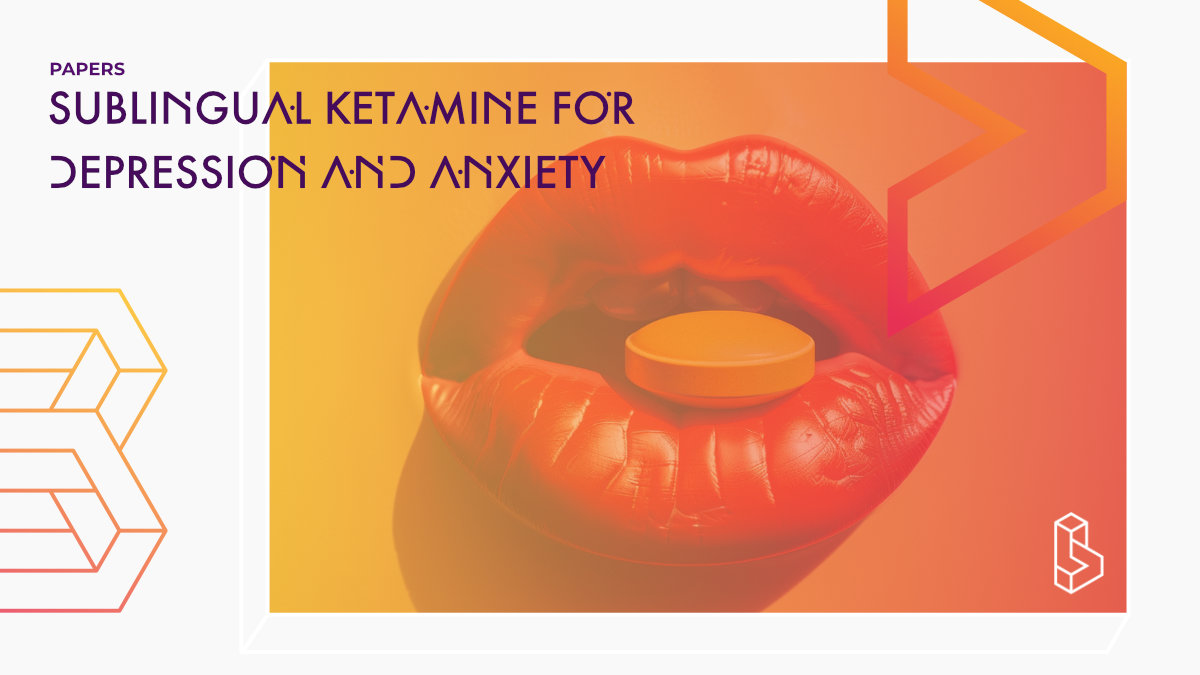This retrospective analysis (n=431) of at-home ketamine treatments (1x p/w, 50-400mg lozenges) for depression, generalized anxiety, and social anxiety found statistically significant improvements in symptoms measured via PHQ-9, GAD-7, and SAD-D-10 at all follow-up time points (1-2-3 months). Minor side effects were reported by 18.8% of patients, resolving within 24 hours, and the majority concluded treatment within ≤ 6 months. No significant differences were observed between treatment-resistant and non-resistant depression outcomes.
Abstract of Sublingual Ketamine for Depression and Anxiety: A Retrospective Study of Real-World Clinical Outcomes
“Objective: To evaluate the effectiveness of repeated at-home ketamine treatments for depression, generalized anxiety, and social anxiety and assess safety in terms of adverse effects and tendency towards long-term use.
Methods: This retrospective analysis included patients with depression, generalized anxiety, and/or social anxiety who received ketamine treatment (delivered at-home via low-dose, sublingual lozenges) through a private telehealth provider. Data was collected between May 2022 and April 2023. The primary outcome was change in depression, generalized anxiety, and social anxiety symptoms from baseline to three follow-up time points, measured via Patient Health Questionnaire (PHQ-9), Generalized Anxiety Disorder Assessment (GAD-7), and Social Anxiety Disorder Severity Scale (SAD-D-10), with analysis subgroups established based on baseline diagnosis. Secondary outcomes included side effects, adverse events, long-term use, well-being improvements, and comparison of outcomes between treatment-resistant and non-resistant depression cases.
Results: Of 431 patients (mean [SD] age, 43.6 [10.9] years; 49.2% women), 81 (18.8%) reported minor side effects resolving within 24 hours, and 397 concluded treatment in ≤ 6 months. Statistically significant improvement on the primary outcome was observed at all follow-ups in all three subgroups (p < 0.001). No significant differences were found between treatment-resistant and non-resistant depression outcomes.
Conclusions: Repeated sublingual ketamine significantly reduced depression, generalized anxiety, and social anxiety with no major adverse events and minimal tendency towards long-term use observed. These findings prompt further exploration of ketamine as an alternative or adjunct to medications such as SSRIs and benzodiazepines to minimize response delays and dependence risk.”
Authors: Lauren N. Swanson, Lila S. Jones, Jose Muñoz Aycart, Zhipeng Zhu, David M. Rabin & Taylor Kuhn
Summary of Sublingual Ketamine for Depression and Anxiety: A Retrospective Study of Real-World Clinical Outcomes
Introduction
Depressive and anxiety disorders are highly prevalent, debilitating conditions with considerable negative impacts on global disability and health-related quality of life. Despite their prevalence, treating them remains challenging, with SSRIs lacking widespread effectiveness and benzodiazepines having a range of undesirable side effects. Ketamine has been identified as a promising new treatment option for depression, but most research has focused on its use in more severe, treatment-resistant cases. It may also be useful for generalized anxiety disorder and social anxiety disorder.
Methods
Find this paper
https://doi.org/10.1101/2024.01.30.24301798
Open Access | Google Scholar | Backup | 🕊
Cite this paper (APA)
Swanson, L. N., Jones, L. S., Munoz Aycart, J., Zhu, Z., Rabin, D. M., & Kuhn, T. (2024). Sublingual Ketamine for Depression and Anxiety: A Retrospective Study of Real-World Clinical Outcomes. medRxiv, 2024-01.
Study details
Compounds studied
Ketamine
Topics studied
Depression
Anxiety
Treatment-Resistant Depression
Study characteristics
Observational
Open-Label
Longitudinal
Within-Subject
Randomized
Participants
431
Humans
Institutes
Institutes associated with this publication
Wonder SciencesWonder Sciences is a mental health and wellness ecosystem that pioneers innovative approaches to treatment and research.
Compound Details
The psychedelics given at which dose and how many times
Ketamine 50 - 400mg | 1x

